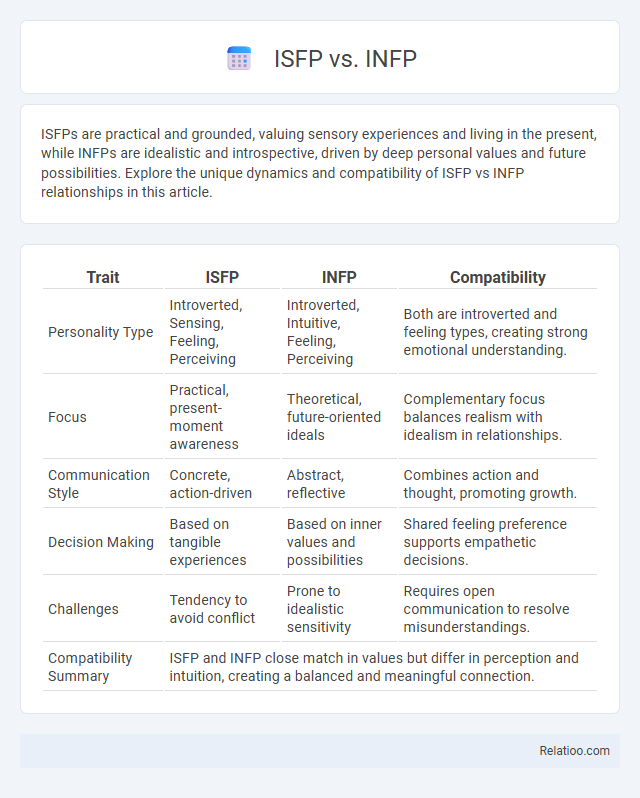ISFPs are practical and grounded, valuing sensory experiences and living in the present, while INFPs are idealistic and introspective, driven by deep personal values and future possibilities. Explore the unique dynamics and compatibility of ISFP vs INFP relationships in this article.
Table of Comparison
| Trait | ISFP | INFP | Compatibility |
|---|---|---|---|
| Personality Type | Introverted, Sensing, Feeling, Perceiving | Introverted, Intuitive, Feeling, Perceiving | Both are introverted and feeling types, creating strong emotional understanding. |
| Focus | Practical, present-moment awareness | Theoretical, future-oriented ideals | Complementary focus balances realism with idealism in relationships. |
| Communication Style | Concrete, action-driven | Abstract, reflective | Combines action and thought, promoting growth. |
| Decision Making | Based on tangible experiences | Based on inner values and possibilities | Shared feeling preference supports empathetic decisions. |
| Challenges | Tendency to avoid conflict | Prone to idealistic sensitivity | Requires open communication to resolve misunderstandings. |
| Compatibility Summary | ISFP and INFP close match in values but differ in perception and intuition, creating a balanced and meaningful connection. | ||
Introduction to ISFP and INFP Personality Types
ISFP and INFP are both introverted feeling personality types within the Myers-Briggs framework, but they differ in cognitive functions and life approach. ISFPs, known as Adventurers, prioritize sensory experiences and present-moment awareness, showing artistic creativity and practical action. Your understanding of these types helps clarify how ISFPs seek tangible expressions of desire, while INFPs explore deeper emotional meaning and idealism.
Core Differences Between ISFP and INFP
ISFPs are sensory-focused individuals who engage with the world through concrete experiences and tend to have a strong appreciation for aesthetics and the present moment, while INFPs prioritize intuition and abstract ideas, often driven by deep-seated personal values and idealism. You may notice ISFPs express their creativity through tangible, hands-on activities, whereas INFPs often channel their creativity into writing or conceptual thinking. Desire in this context aligns with ISFPs' motivation to seek sensory fulfillment, contrasted with INFPs' inner drive for authenticity and meaning.
Cognitive Functions: ISFP vs INFP
ISFPs lead with Introverted Feeling (Fi), which prioritizes personal values and authentic self-expression, followed by Extraverted Sensing (Se) that directs attention to present sensory experiences and immediate environment. INFPs also lead with Introverted Feeling (Fi), but their auxiliary function is Extraverted Intuition (Ne), enabling them to explore abstract possibilities and future-oriented ideas more deeply than ISFPs. Your understanding of these cognitive function differences highlights that ISFPs are more grounded in the present moment, while INFPs are driven by imaginative, conceptual exploration.
Decision-Making Styles
ISFPs rely heavily on sensory experiences and immediate realities, making decisions based on present emotions and practical considerations, often seeking harmony through action. INFPs prioritize internal values and abstract ideals, approaching decisions with deep reflection and a desire for authenticity that aligns with their moral framework. Desire influences both types by intensifying motivation toward choices that fulfill personal meaning, with ISFPs driven by concrete desires and INFPs by aspirational or imaginative longings.
Emotional Expression and Sensitivity
ISFPs channel emotional expression through vivid sensory experiences and subtle gestures, while INFPs articulate deep feelings with thoughtful reflection and idealistic language. Both types exhibit high sensitivity, but ISFPs are more attuned to the present moment and external environments, whereas INFPs are sensitive to internal values and abstract emotions. Your desire for authentic emotional connection thrives when these differences in expression and sensitivity are understood and respected.
Approach to Relationships and Friendships
ISFPs approach relationships with a focus on sensory experiences and harmony, valuing loyalty and present-moment connection, while INFPs prioritize deep emotional understanding and shared values, seeking meaningful, authentic bonds. Desire, often driven by INFP traits, amplifies the longing for closeness and emotional resonance, making your relationships intensely personal and transformative. Both personality types emphasize empathy and authenticity, but ISFPs express affection through actions, whereas INFPs communicate through introspection and emotional depth.
Career Preferences and Work Environments
ISFPs prefer hands-on, creative careers such as design, art, or culinary work, thriving in flexible and low-pressure environments that allow personal expression and independence. INFPs are drawn to meaningful careers in counseling, writing, or advocacy, excelling in settings that encourage deep reflection and alignment with personal values. Your ideal work environment depends on balancing ISFP's need for sensory experiences and practical tasks with INFP's preference for introspection and idealism, highlighting the importance of roles that foster autonomy and purpose.
Hobbies and Lifestyle Choices
ISFPs engage in hands-on hobbies such as painting, hiking, and crafting, emphasizing sensory experiences and personal aesthetics, while INFPs prefer introspective activities like writing, reading, and creative storytelling that align with their idealistic values. Desire often motivates ISFPs to seek spontaneity and adventure, favoring lifestyle choices that foster immediate sensory enjoyment and freedom. INFPs channel desire into meaningful connections and self-expression, choosing lifestyles centered on authenticity, deep relationships, and personal growth.
Common Strengths and Challenges
ISFPs and INFPs share common strengths such as strong empathy, creativity, and a deep appreciation for authenticity, which fuels their passion for meaningful experiences. Both personality types often face challenges with decision-making under pressure and may struggle with expressing their internal emotions clearly to others. The desire for harmony and personal growth drives ISFPs to seek sensory experiences, while INFPs prioritize ideals and internal values, influencing how they approach conflicts and challenges.
Tips for Understanding ISFPs and INFPs
ISFPs and INFPs share a strong value for authenticity and emotional depth, but ISFPs express their feelings through tangible experiences while INFPs process them internally with idealism. To understand ISFPs, you should appreciate their need for sensory engagement and respect their quiet, action-oriented nature, whereas understanding INFPs involves recognizing their introspective idealism and providing space for their reflective thought. Your approach can be enhanced by encouraging ISFPs' creative outlets and supporting INFPs in articulating their complex inner values.

Infographic: ISFP vs INFP
 relatioo.com
relatioo.com